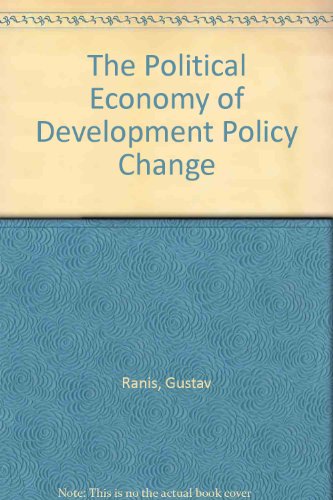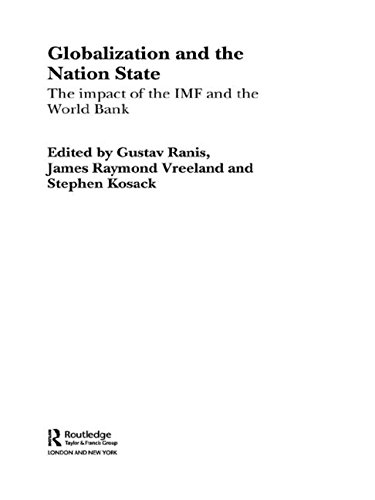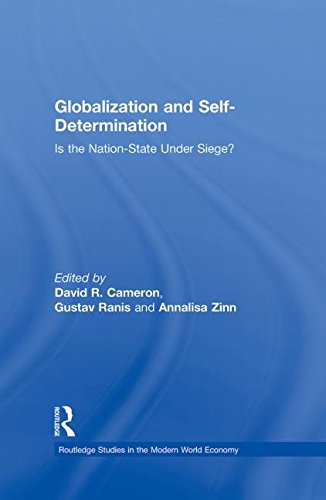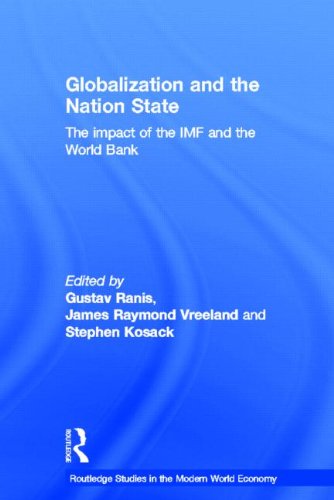Background
Ranis, Gustav was born on October 24, 1929 in Darmstadt, Germany. Son of Max and Bettina (Goldschmidt) Ranis.


(Since World War II most developing economies have tried t...)
Since World War II most developing economies have tried to modernize their economies. This book attempts to explain why the achievement of growth and distributional objectives has varied so enormously, attempting to link different systems' initial conditions to policy responses over a long period. The authors first present a theoretical framework for tracing the impact of positive and negative exogenous shocks on the major macroeconomic variables, seen as political instruments for promoting growth in the "typical" developing country case. This framework is then applied to three pairs of countries: Colombia and Mexico representing Latin America, where a wealth of resources has been squandered by the failures of import substitution, protectionism and frequent policy changes; South Korea and Taiwan representing the successful east Asian region where export-led growth has been dramatic; Thailand and the Philippines as intermediate cases which have gradually diverged, the former achieving excellent growth rates, and the latter following the Latin route,
http://www.amazon.com/gp/product/1557862508/?tag=2022091-20

(Engendered by renewed interest in development, "Growth an...)
Engendered by renewed interest in development, "Growth and Development from an Evolutionary Perspective" is a result of recent work in the 'new growth theory' arena. This authoritative survey uses 'comparative analytical economic history' to trace the evolution of development theory from the Physiocrats and the classical School to Solow, Lewis, and Lucas and Roemer. Through outlining historical time, typological differences across developing societies, and the transition from agrarianism to modern economic growth, the book arrives at contemporary analyses and current policies. Theoretical sections develop a general system of growth equations that focus on the central role of technology change.Students can apply these equations to sub-phases of transition as well as to the modern growth epoch. Policy-oriented sections discuss contemporary concerns with distribution, poverty alleviations, and human development as they relate to growth over time. The book identifies the policy implications of the development process, comparing East Asian with Latin American cases. In considering future policy, the book demonstrates how political economy factors suggest and enhanced endogenization of policy choices.
http://www.amazon.com/gp/product/1557860793/?tag=2022091-20

( This book brings together an international team of cont...)
This book brings together an international team of contributors to assess the political economy of the IMF and World Bank programmes. The cutting-edge techniques of the new political economy are thus brought to bear on international issues for the first time. The book includes contributions from leading North American economists - Stephen Coate, Stephen Morris, Ravi Kanbur and Allen Drazen - as well as European-based analysts including Graham Bird and Frances Stewart.
http://www.amazon.com/gp/product/0415426294/?tag=2022091-20

( Is the nation state under siege? A common answer is tha...)
Is the nation state under siege? A common answer is that globalization poses two fundamental threats to state sovereignty. The first concerns the unleashing of centrifugal and centripetal forces - such as increasing market integration and the activities of institutions like the IMF, World Bank, and WTO - that imperil state sovereignty from 'outside' the nation state. The second threat emanates from self-determination movements that jeopardize state sovereignty from 'inside'. Rigorously analyzing popular hypotheses on globalization's effect on state sovereignty from a broad social sciences perspective, the authors use empirical evidence to suggest that globalization's multilevel threats to state sovereignty have been overestimated. In most instances globalization is likely to generate pressure for increased government spending while only one form of market integration - foreign direct investment by multinational enterprises - appears to increase any feeling of economic insecurity. This volume will be invaluable to course instructors at both graduate and undergraduate levels, policy makers and members of the general public who are concerned about the effects of globalization on the nation-state.
http://www.amazon.com/gp/product/041577022X/?tag=2022091-20

( This book brings together an international team of cont...)
This book brings together an international team of contributors to assess the political economy of the IMF and World Bank programmes. The cutting-edge techniques of the new political economy are thus brought to bear on international issues for the first time. The book includes contributions from leading North American economists - Stephen Coate, Stephen Morris, Ravi Kanbur and Allen Drazen - as well as European-based analysts including Graham Bird and Frances Stewart.
http://www.amazon.com/gp/product/0415700868/?tag=2022091-20
Ranis, Gustav was born on October 24, 1929 in Darmstadt, Germany. Son of Max and Bettina (Goldschmidt) Ranis.
Bachelor summa cum laude, Brandeis University, 1952. Honorary degree, Brandeis University, 1982. Master of Arts, Yale University, 1953.
Doctor of Philosophy, Yale University, 1956.
Economics, Overseas Development Program, Ford Foundation, New York, 1957-1958. Joint Director Research, Institute, Institution Development Economics, Karachi, Pakistan, 1959-1961. Instructor, Assistant Professor, Association Director, Economics Growth Center, Association Professor, Professor of Economics, Yale University, 1956-1957, 1960-1961, 1961-1965, 1961-1964, 1964-1981.
Assistant Administration Program and Policy, Agency International Development, United States Department State, 1965-1967. Ford Foundation Visiting Professor, University Andes, Colombia,
7. Frank Altschul Professor International Economics, Yale University, New Haven, Connecticut, United States of America, since 1982.
Editorial Board, Desarrollo y Sociedad, CEDE, University Andes, Colombia, since 1978, Pakistan Development Review, 1978-1980, Economics Review, University Teheran, 1977.
Junior Phi Beta Kappa, Brandéis University, 1951. Sterling Fellow, Yale University, 1954-1955. United States-Social Science Research Council, United Kingdom or United States of America Fellow, Japan, 1955-1956.
Fellow, Member Board Trustees, Brandéis University, 1961-1967,1968-. Ford Foundation Faculty Fellow, Mexico, 1971-1972.
(Engendered by renewed interest in development, "Growth an...)
( This book brings together an international team of cont...)
( This book brings together an international team of cont...)
( Is the nation state under siege? A common answer is tha...)
(Since World War II most developing economies have tried t...)
Author: (with John Fei) Development of the Labor Surplus Economy: Theory and Policy, 1964. (with Fei and Shirley Kuo) Growth with Equity: The Taiwan Case, 1979. (with Keijiro Otsuka and Gary Saxonhouse) Comparative Technology Choice in Development, 1988.(with F. Stewart and E. Angeles-Reyes) Linkages in Developing Economies: A Philippine Study, 1990. (with S.A. Mahmood) Political Economy of Development Policy Change, 1992. (with John C. H. Fei) Growth and Development from an Evolutionary Perspective, 1997, Globalization and the Nation State, 2006, Globalization and Self-Determination: In the Nation-State Under Siege?, 2006.Editor: Taiwan: From Developing to Mature Economy, 1992, En Route to Modern Economic Growth: Latin America in the 1990s, 1994, Japan and the United States in the Developing World, 1997. Co-editor: The State of Development Economics, 1988, Science and Technology: Lessons for Development Policy, 1990. Member editorial board Journal International Development, since 1995, Oxford Development Studies, since 1996, International Economic Journal, since 2005.
Early work was concentrated on analysing Japanese post-Meiji economic development as a case of successful early transition to modern growth. I later moved into comparative Asian development analysis focussing first on Pakistan and later on Korea and Taiwan. My attention was initially concentrated on the analysis of balanced growth in the dual economy, with emphasis on the financing of development and the choice of factor proportions.
This work then led me into a long-term collaboration with John Fei, the first product of which, Development of the Labor Surplus Economy, presented a two-sector model of development, focusing on both the behavioural and organisational aspects
of dualism, as well as on the special role of innovational intensity and bias in non-agricultural production. Later work led me to a further exploration of the importance of technology choices as well as the direction of technology change for LDC employment and growth objectives. At the same time, Fei and I moved into work on the construction of open, i.e. trade-related, dualistic models, including further refinement of the specification of agricultural activities.
In the late 1970s, the emphasis of my work shifted to an analysis of the relationship between patterns of growth and the distribution of income.
The tool utilised was a Gini decomposition procedure first empirically applied to the case of Taiwan, leading to a volume entitled Growth with Equity (1979). Other country applications have followed since. Most recently I have turned my attention again to the comparative analysis of historical development experiences by contrasting the contemporary Taiwanese and Korean record with that of historical Japan, and moving at the same time to a comparison between the East Asian labour surplus economy and those of other typological representatives, including Mexico and Colombia in Latin America, the Philippines in Asia, and Ghana in Africa.
Also in recent years, I have turned my attention increasingly to the role of science and technology in development as well as to the importance of agricultural/industrial linkages in the context of a successful participatory growth path.
Trustee Brandeis University, 1967-1993, chairman academy affairs committee, 1986-1993. Member American Economic Association, Council Foreign Relations, Overseas Development Council (member advisory committee). Fellowship Human Development & Capability Association.
Married Ray Lee Finkelstein, June 15, 1958. Children: Michael Bruce, Alan Jonathan, Bettina Suzanne.
